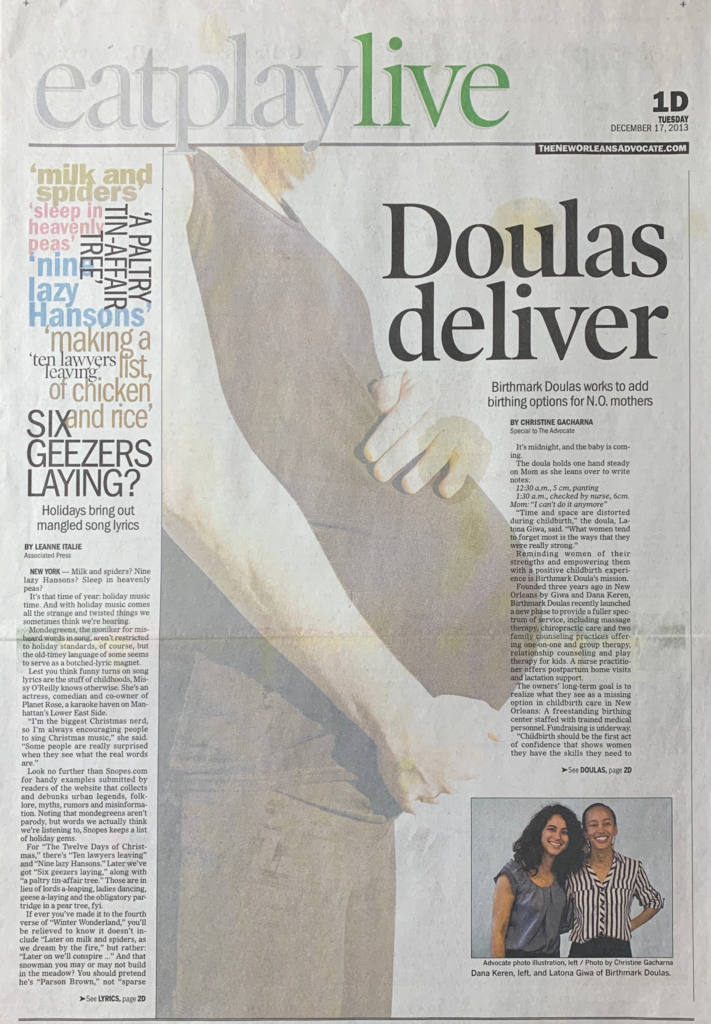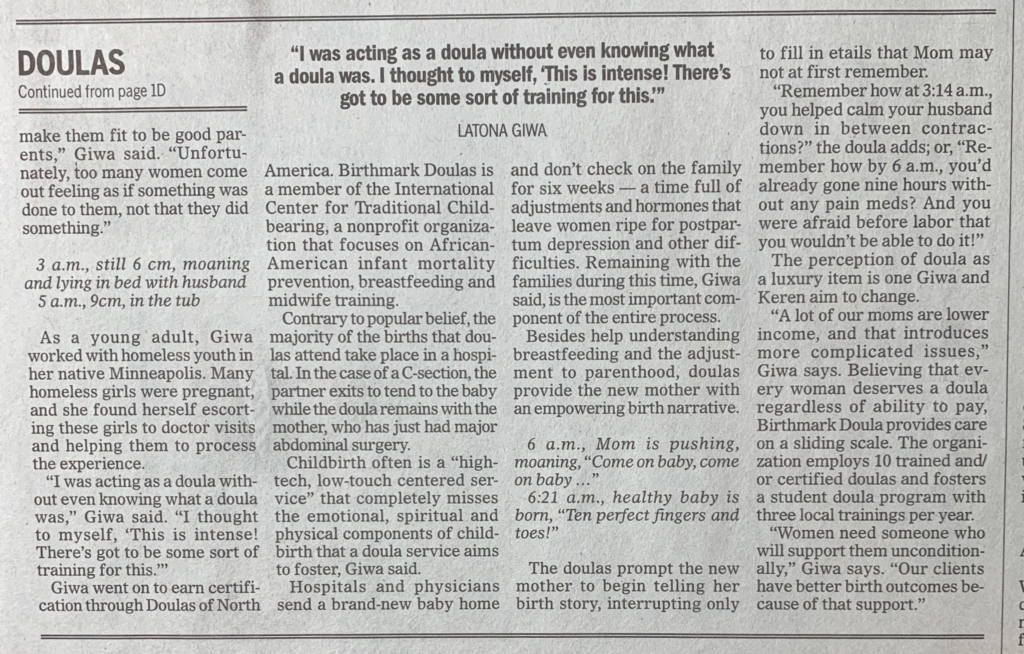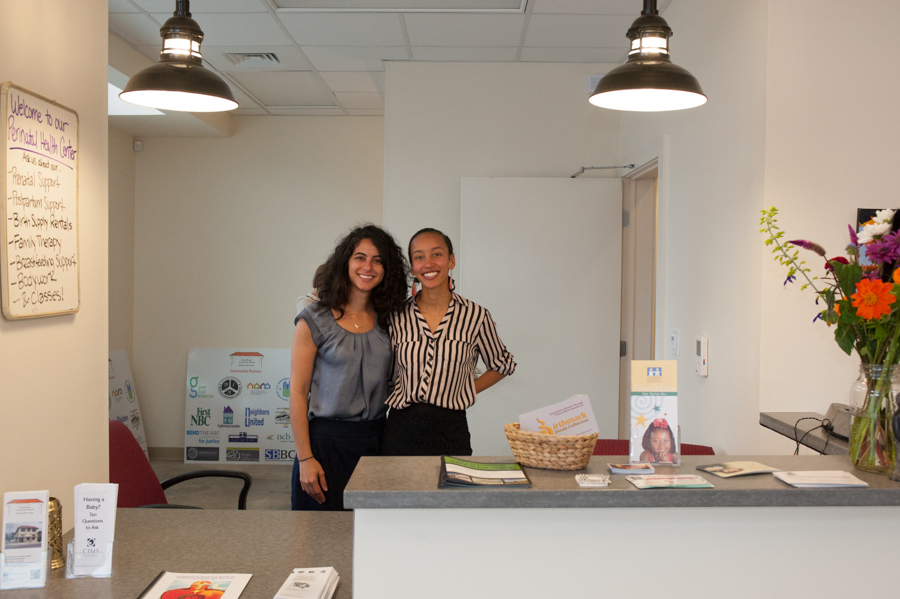Doulas deliver


It’s midnight and the baby is coming.
The doula holds one hand steady on Mom as she leans over to write notes:
12:30 a.m., 5 cm, panting
1:30 a.m., checked by nurse, 6cm. Mom: ”I can’t do it anymore”
“Time and space are distorted during childbirth,” the doula, Latona Giwa, said. “What women tend to forget most is the ways that they were really strong.”
Reminding women of their own strengths and empowering them with a positive childbirth experience as they transition from pregnancy into the early stages of motherhood is the crux of Birthmark Doula’s business.
Founded three years ago by Giwa and Dana Keren, Birthmark Doulas recently launched a new phase to provide a fuller spectrum of service for the perinatal years, including massage therapy, chiropractic care, and two-family counseling practices offering one-on-one, group therapy, relationship counseling, and play therapy for kids. A nurse practitioner offers postpartum home visits and lactation support.
The owners’ long-term goal is to realize what they see as the missing option in a woman’s choice of childbirth care: a freestanding birthing center staffed with trained medical personnel. A fundraising mission is already underway.
“Childbirth should be the first act of confidence that shows women they have the skills they need to make them fit to be good parents,” Giwa says. “Unfortunately, too many women come out feeling as if something was done to them, not that they did something.”
3 a.m., still 6 cm, moaning and lying in bed with husband
5 a.m., 9cm, in the tub
Contrary to popular belief, the majority of the births that doulas attend take place in a hospital. In the case of a C-section, the partner exits to tend to the baby while the doula remains with Mom, who has just had major abdominal surgery.
“It breaks my heart,” Giwa says of mothers abandoned during this time. “Most of the time, these women are walking around traumatized by their birth experiences, and instead of it being a joyful event, it’s this nasty secret because they don’t feel they can complain because they have a healthy baby.”
“We see a ton of second-time moms for exactly those reasons,” Giwa continues. “They do their ‘normal OB birth in a hospital and they’re really unsatisfied but they don’t know why. And then they hear about us from their Facebook friend and they realize there is this whole other way that they didn’t even know about before. And that’s also how most of us became doulas. Most of us are mothers.”
Typically overseen by traditional providers, Giwa says most childbirth experiences are a “high-tech, low-touch centered service” that completely misses the emotional, spiritual, and physical components of childbirth that a doula service aims to foster.
Traditional medical care, for example, sends a brand new baby home and doesn’t check on the family again for six weeks — a time full of adjustments and hormones that leave women ripe candidates for postpartum depression and other difficulties. Remaining with the families during this time, Giwa says, is the most important component of the entire process.
“We already have a relationship with these women,” she says. “We take care of families in their most vulnerable moment, and we can spot these problems before they become a disaster.”
In the weeks following the birth, Birthmark Doulas provides the new mother with perhaps her greatest parenting tool available: a birth narrative.
The doulas prompt the new mother to begin telling her birth story, interrupting only to fill in important details that Mom may not at first remember.
“Remember how at 3:14 a.m., you helped calm your husband down in between contractions?” the doula adds in; or, “Remember how by 6 a.m., you’d already gone nine hours without any pain meds? And you were afraid before labor that you wouldn’t be able to do it!”
The perception of a doula as a luxury item is one Giwa and Keren aim to change, believing that every woman deserves a doula. Birthmark Doulas employs 10 trained and/or certified doulas and fosters a student doula program with three local trainings per year.
“It’s a funny line we walk,” Giwa says. “We have a social mission to empower women to have a better childbirth experience, and we’re a business, and we want to pay our doulas their professional worth. We are already doing too many things for free as women, and we become socialized to think that’s okay.”
“Women need someone who will support them unconditionally,” Giwa says. “Our clients have better birth outcomes because of that support.”
6 a.m., Mom is pushing, moaning, “Come on baby, come on baby …”
6:21 a.m., healthy baby is born, “Ten perfect fingers and toes!”
“Moms tell us, ‘I couldn’t have done this without you!’ which isn’t true; they would’ve had this baby with or without us,” Giwa says. “But that really is the power of what we do, empowering women with their own strength to have a much more positive birth experience. We’re working large issues, but we’re working one family at a time. We’re slowly changing how birth is done in Louisiana.”
For more information, visit Birthmark Doulas at http://birthmarkdoulas.com.

